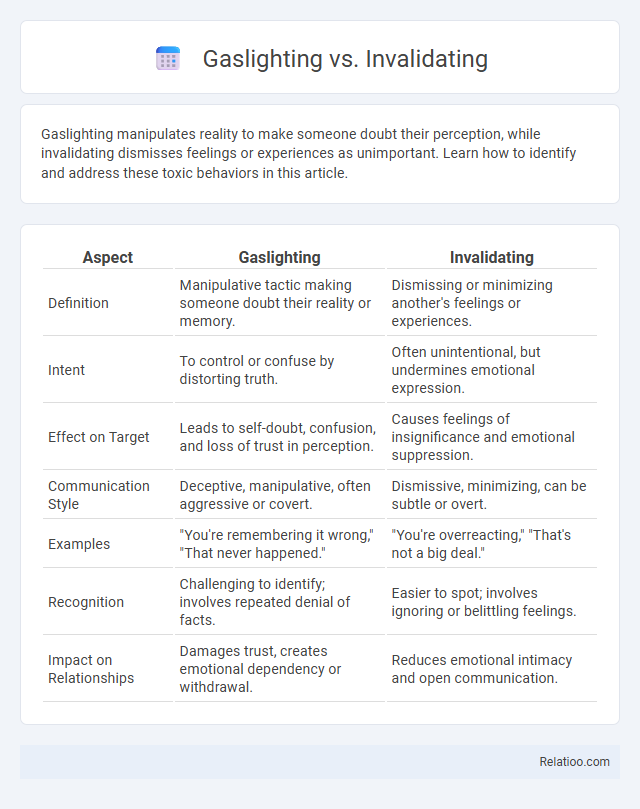Gaslighting manipulates reality to make someone doubt their perception, while invalidating dismisses feelings or experiences as unimportant. Learn how to identify and address these toxic behaviors in this article.
Table of Comparison
| Aspect | Gaslighting | Invalidating |
|---|---|---|
| Definition | Manipulative tactic making someone doubt their reality or memory. | Dismissing or minimizing another's feelings or experiences. |
| Intent | To control or confuse by distorting truth. | Often unintentional, but undermines emotional expression. |
| Effect on Target | Leads to self-doubt, confusion, and loss of trust in perception. | Causes feelings of insignificance and emotional suppression. |
| Communication Style | Deceptive, manipulative, often aggressive or covert. | Dismissive, minimizing, can be subtle or overt. |
| Examples | "You're remembering it wrong," "That never happened." | "You're overreacting," "That's not a big deal." |
| Recognition | Challenging to identify; involves repeated denial of facts. | Easier to spot; involves ignoring or belittling feelings. |
| Impact on Relationships | Damages trust, creates emotional dependency or withdrawal. | Reduces emotional intimacy and open communication. |
Understanding Gaslighting: Definition and Key Traits
Gaslighting is a manipulative tactic where someone intentionally distorts reality to make you doubt your perceptions, memories, or feelings. Key traits include persistent denial, contradiction of facts, and minimization of your experiences to gain control or power. Understanding gaslighting helps distinguish it from invalidating, which may dismiss feelings unintentionally, while gaslighting actively seeks to confuse and undermine your sense of truth.
What is Invalidation? Exploring Emotional Dismissal
Invalidation refers to the act of dismissing or minimizing someone's feelings, thoughts, or experiences, leading to emotional dismissal and confusion. Unlike gaslighting, which manipulates reality to make you doubt your perception, invalidation simply rejects or ignores your emotional responses without necessarily altering facts. Recognizing invalidation is crucial for maintaining your emotional well-being and fostering healthy communication.
Core Differences Between Gaslighting and Invalidating
Gaslighting involves manipulating someone into doubting their own reality or sanity, while invalidating dismisses or rejects their feelings and experiences without necessarily distorting the truth. The core difference lies in gaslighting's intent to confuse and control your perception, whereas invalidation simply denies the legitimacy of your emotions. Understanding these distinctions empowers you to recognize and address emotional abuse more effectively.
Psychological Impact: Effects on Victims
Gaslighting undermines your sense of reality by making you question your perceptions, often leading to confusion, anxiety, and diminished self-trust. Invalidating dismisses your feelings and experiences, causing emotional pain, lowered self-esteem, and a feeling of invisibility. Both forms of psychological manipulation can severely impact mental health, increasing the risk of depression, anxiety disorders, and long-term trauma.
Recognizing the Signs of Gaslighting
Recognizing the signs of gaslighting involves identifying patterns where an individual persistently denies or distorts reality, causing confusion and self-doubt in the victim. Unlike invalidating, which dismisses feelings or experiences, gaslighting manipulates facts to undermine a person's perception and memory, often leading to decreased self-confidence and dependence on the abuser. Key indicators include repeated lying, contradictory statements, and efforts to isolate the victim from support systems.
Common Phrases Used in Invalidating Behavior
Common phrases used in invalidating behavior often include dismissive statements like "You're overreacting," "That never happened," or "You're too sensitive," which can undermine Your feelings and experiences. Invalidating language minimizes emotional responses and can cause confusion, self-doubt, and frustration by denying the validity of Your perspective. Recognizing these phrases is crucial in distinguishing invalidation from gaslighting, where intentional deception and manipulation aim to distort reality.
Gaslighting in Relationships: Red Flags
Gaslighting in relationships manifests as deliberate manipulation where one partner distorts facts to make the other doubt their perception, memory, or sanity, leading to confusion and self-doubt. Red flags include persistent denial of events, minimizing feelings, and shifting blame to make the victim question their reality. Recognizing these behaviors early is crucial to maintaining emotional well-being and addressing toxic dynamics effectively.
Why People Invalidate Others: Underlying Motives
People often invalidate others to maintain control, protect their ego, or avoid accountability, which can stem from insecurity or fear of vulnerability. Invalidating someone's feelings minimizes their experiences, creating confusion and self-doubt, which parallels gaslighting's manipulation but lacks the explicit intent to alter reality. Understanding these underlying motives reveals patterns of emotional abuse that damage trust and hinder healthy communication.
Strategies to Respond to Gaslighting and Invalidation
Recognizing gaslighting involves identifying manipulative tactics that distort your reality, while invalidation dismisses your feelings or experiences, undermining your confidence. Your best strategies to respond include setting firm boundaries, documenting interactions to maintain clarity, and seeking external validation from trusted sources or professionals. Empower yourself by calmly asserting your perception and prioritizing your mental well-being over attempts to rationalize the manipulator's behavior.
Healing and Recovery: Regaining Self-Trust
Healing from gaslighting requires rebuilding self-trust through affirming your reality and setting healthy boundaries, which counters the manipulation of your perception. Invalidating experiences damage your confidence, so prioritizing self-validation and seeking supportive environments is key to recovery. Your journey to regain clarity involves therapy, mindfulness, and reaffirming your worth to restore emotional balance and resilience.

Infographic: Gaslighting vs Invalidating
 relatioo.com
relatioo.com